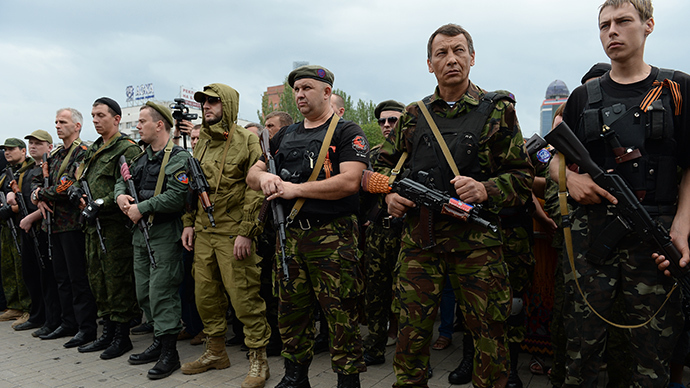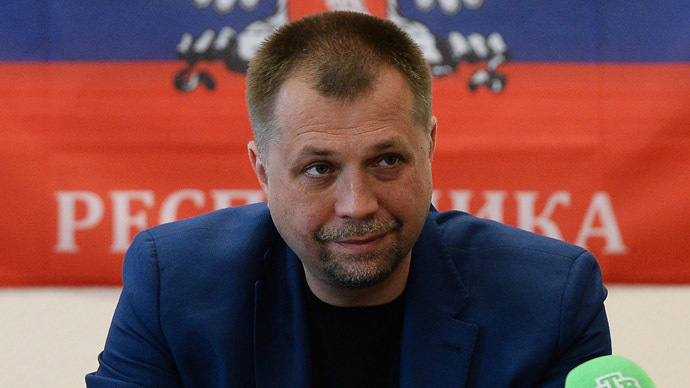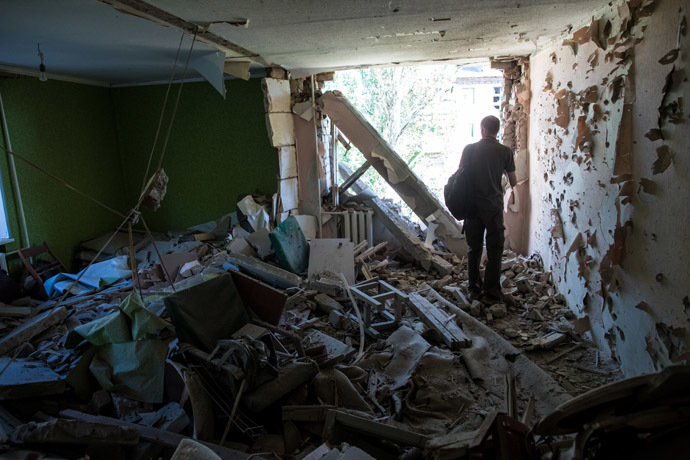Donetsk self-defense forces agree to ceasefire until 0700 GMT Friday

The leader of self-proclaimed Donetsk People's Republic in eastern Ukraine agreed to a ceasefire in the region until 10 a.m. local time on Friday. He stressed that the self-defense force's ceasefire will come only as a reciprocal move.
"The duration of the ceasefire is the same as announced previously - before 10 a.m. on June 27. During this period monitoring by Russian and OSCE representatives will be organized. We hope that during ceasefire from both sides we will be able to reach an agreement and start consultations on the process of peaceful settlement of the conflict," Aleksandr Boroday, prime minister of the self-proclaimed Donetsk People’s Republic said live on Rossiya 24 TV.

Ukrainian, Russian and OSCE representatives gathered in Donetsk on June 23 for talks on peaceful settlement of the conflict.
OSCE special envoy to Ukraine Heidi Tagliavini, Russia's ambassador to the country Mikhail Zurabov, representatives of the self-proclaimed people's republics of Donetsk and Lugansk, as well as the former president of Ukraine Leonid Kuchma met to define stages of a peace plan in the country's east.
Boroday has pointed out that the Donetsk meeting on Monday was not formal talks, but rather unofficial preliminary consultations. "In the DNR government house at least some dialogue has begun from the side of Kiev, who had preferred to speak the language of heavy artillery for several months," he was cited as saying by Itar-Tass news agency.
Earlier Ukrainian President Petro Poroshenko laid out his plan to deescalate the conflict, announcing a unilateral ceasefire from June 20 until June 27, the day Kiev plans to sign the EU Association agreement. On Sunday he issued a warning, stating that he had an alternative “detailed plan” of regaining control over south-eastern Ukraine should his current proposal for a truce fail to bring results.
Read more: Poroshenko warns of ‘detailed Plan B’ if Ukraine ceasefire fails
The news on mutual ceasefire has been confirmed by former Ukrainian president Leonid Kuchma. "We agreed on bilateral ceasefire lasting until 10 a.m. on June 27," said Kuchma after taking part in talks on the conflict's settlement in Donetsk on June 23.

The DNR leader named two reasons for which the Donetsk meeting cannot be considered as formal talks. "A fully valid negotiation process is possible only after Kiev fulfils seven conditions, proposed today by the co-chairman of the National Front of Novorossiya Oleg Tsarev. These conditions are our common position," Boroday said.
Among the conditions are withdrawal of Kiev forces from the territories of the self-proclaimed people's republics of Donetsk and Lugansk, compensation payments to the conflict's victims by Kiev, amnesty to militia and political prisoners, as well as agreement between the Ukrainian president and parliaments of the people's republics on a constitutional act, defining their status.
The absence of official state powers and status of the Donetsk meeting participants was named as the second reason by the DNR leader, who presumably referred to Kiev's representative, ex-president Leonid Kuchma.
The involvement of the latter was initiated by Ukrainian President Petro Poroshenko, who is said to have had a meeting with Ukrainian representatives to the talks in Kiev before they headed for Donetsk. "Leonid Kuchma's participation indicates the Ukrainian president’s close attention to this mission," said Poroshenko, according to his press service statement.
Leonid Kuchma was the president of Ukraine in 1994-2005.

Russia's ambassador to Ukraine Mikhail Zurabov expects the talks to continue. "We expect that in the near future position of representatives of Donetsk and Lugansk will be additionally worked out, and they will announce their readiness to continue consultations in order to solve two problems: firstly, to achieve a sustainable truce and sustainable peace, non-renewal of fire, and secondly - the launch of an inclusive negotiation process," Zurabov told Rossiya 24 TV.
Ahead of the Donetsk meeting, one of Ukraine's representatives, Viktor Medvedchuk, leader of "Ukrainian Choice" political organization, identified the aim of the talks as "implementation of the peace plan to resolve the situation in eastern Ukraine, end the bloodshed, preventing people's deaths, preserving the country's unity."
The Russian President's press-secretary Dmitry Peskov said that Vladimir Putin welcomed the participation of Viktor Medvedchuk in the talks. "He has consistently supported the idea of Ukraine's federalization. He is respected in Kiev, and he is also familiar to the West," Peskov said. He added that "the Russian President has repeatedly stated that a solution to Ukrainian crisis can only be possible through peaceful dialogue and consideration of the interests of eastern regions of the country."
Leonid Slutsky, the chairman of the Russian State Duma committee for CIS affairs, believes the meeting Monday in Donetsk may become a turning point in overcoming the Ukrainian crisis. Slutsky also said he found the team of participants “the strongest list of negotiators of all possible. Hopefully, it will become the most effective too."












